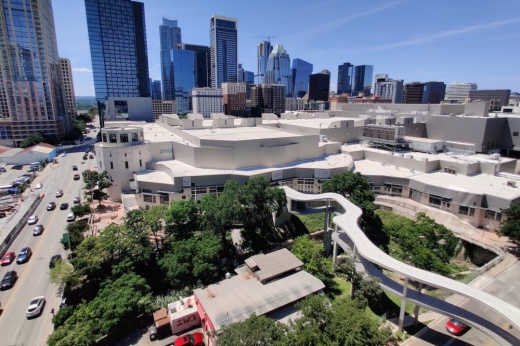What's happening
The city's reconstruction of the downtown exhibition hall officially begins next April, when the facility will be shut down before it's demolished. The new, larger convention center is expected to open ahead of the 2029 spring festival season.
The new convention complex was previously expected to include more than 700,000 square feet of exhibition space situated below street level, plus a few stories of above-ground space.
Second and Third streets will be reopened through the property, and new public areas with features such as storefronts and art installations will be added on the site. The structure will also connect to a future Project Connect light rail stop downtown.
The Austin Convention Center team previously proposed using two of the property's six city blocks to partner with a private entity on a tower project that could have included a hotel or new housing. However, staff reported in late September that those are no longer possible as development moves forward.
Zooming in
The hotel or market-rate residential project was still under consideration earlier this year, after a city consultant reported that other options, such as an office tower or affordable housing, wouldn't pencil out. But changing conditions have ended plans for any such addition.

- The high cost of the underground infrastructure needed to support a high-rise, estimated at about $20 million and beyond the redevelopment budget
- Downtown's current housing market, which led a city consultant to identify the residential option as unfeasible
- A provision tied to the city-owned Hilton Austin's financing blocking the city from building a new hotel downtown until the mid-2030s
While that aspect of the project is no longer moving forward, Zamesnik noted the loss will allow the new convention center to take up a larger footprint. No details on any added exhibition space or building features are finalized as of this fall while design work remains in progress; final schematics could be released by the end of the year or in early 2025.
The outlook
Council member Chito Vela said he was disappointed at where planning ended up this year, and that he still wants to find a way to build a future hotel given Austin's rising prominence as a travel destination.
"The first project was an excellent move, it has brought a lot of revenue to the city, it has helped bring life to downtown. ... Austin is now a vacation and tourism hot spot. I really don’t want to miss the opportunity to bet on ourselves," he said. "We’re expanding the airport to handle all of this additional capacity, but we’re going to pass on an opportunity to build another city-owned hotel that could generate potentially tens of millions of dollars for the city in both property taxes, hotel and motel taxes, and a lease?"
The prospect of any future development on the downtown site is unclear for now. The city won't be able to get involved in a new hotel project in Austin's central business district until 2034 at the earliest, several years after the convention center redevelopment wraps up.
The current project's tight budget and timeline likely prevents any revisions to include the space needed to support future high-rise construction. Taking months to amend designs, delaying the facility's closure beyond early 2029, could also cost Austin tens of millions of dollars in lost convention revenue.
“Missing four spring festival seasons versus just three is quite significant on an economic impact basis," Zamesnik said.
Even without city backing, staff said the downtown hotel scene continues to expand thanks in part to the convention center project—new development that will also benefit the city through property and hospitality tax collections.
For now, final design work for the convention center redevelopment will be accompanied by public engagement, including surveys and focus groups in late 2024.
“We really want the community to be invested in what we have and what we have available, and to hear their ideas," Zamesnik said.





